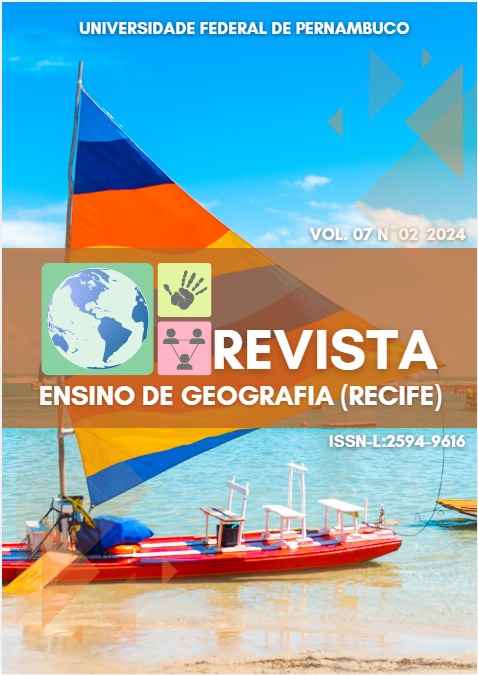Positive impact of the use of active learning methodologies in teaching geography: a bibliographical analysis based on experiences in basic education
DOI:
https://doi.org/10.51359/2594-9616.2024.264079Keywords:
teaching geography, active learning methodologies;, basic educationAbstract
For a long time, the traditional teaching method predominated in educational practices in basic education, in order to establish learning acquired exclusively through the transmission and memorization of content. Directed at Geography, there were several changes in approaches to its study, as well as in its pedagogical conducts. Currently, there are changes in these practices, in order to problematize the exclusively traditional process, thus inserting the active need of the student in his/her teaching-learning process; for this, some of the methodological mechanisms used are active learning methodologies. In view of these contexts, this work was prepared, therefore, being a bibliographic review in which the objective is to analyze the insertion of active methodologies in the teaching of Geography based on experiences in basic education. In this sense, the methodology used was based on a bibliographic review of articles taken from the Google Scholar and Capes Periodicals databases, in order to obtain data regarding the results that were generated through the use of these active mechanisms. Subsequently, after the review, the respective data were systematized in a table for better visualization. In view of the study, it was concluded that the diverse active methodologies effectively provide relevance and support in the teaching of Geography, attesting to the different cognitive skills stimulated, as well as the satisfactory results in the assimilation and problematization of the contents.
References
BACICH, L.; MORAN, J. Metodologias ativas para uma educação inovadora: uma abordagem teórico-prática. Porto Alegre: Penso Editora, 2017.
BORGES, T.S; ALENCAR, G.; Metodologias ativas na promoção da formação crítica do estudante: o uso das metodologias ativas como recurso didático na formação crítica do estudante do ensino superior. Cairu em Revista; n° 04, p. 1 19-143, 2014. Disponível em: https://ufsj.edu.br/portal2-repositorio/File/napecco/Metodologias/Metodologias%20Ativas%20na%20Promocao%20da%20Formacao.pdf. Acesso em 20 ago. 2024.
CAVALCANTI, L. de S. Geografia, Escola e Construção de Conhecimentos. Campinas/SP: Papirus, 1998.
DAROS, T. Por que inovar na educação? In: Camargo e Daros (org.). A sala de aula inovadora. Porto Alegre: Penso, 2018. p. 3.
DA SILVA COSTA, R.; DE LIMA, E. F.; FELICIO, C. M. Metodologias ativas no ensino de geografia: uma experiência educacional no Ensino Médio. Revista Brasileira de Educação em Geografia. Campinas, v. 10, n. 20, p. 580-590, 2020. Disponível em: https://www.revistaedugeo.com.br/revistaedugeo/article/view/995/491. Acesso em 19 ago. 2024.
DE SOUSA, A. S.; DE OLIVEIRA, G. S.; ALVES, L. H. A pesquisa bibliográfica: princípios e fundamentos. Cadernos da FUCAMP, v. 20, n. 43, 2021.p. 66.
DE JESUS, Rafael Justino; PASSOS, Marize Lyra Silva; NOBRE, Isaura Alcina Martins. O uso do jogo migrando e do google earth no ensino de geografia para alunos do ensino médio. In: Anais do XXI Workshop de Informática na Escola. SBC, 2015. p. 167-176.
DEWEY, J. Como Pensamos: como se relaciona o pensamento reflexivo com o processo educativo, uma reexposição. São Paulo, SP: Editora Nacional, 1979. P.43.
FREIRE, P. Pedagogia do oprimido. 42. ed. Rio de Janeiro: Paz e Terra, 2005. P. 39.
FREIRE, P. Pedagogia do oprimido. 42. ed. Rio de Janeiro: Paz e Terra, 2005. P. 46.
LOPES, R; FILHO M.; ALVES, N. Aprendizagem baseada em problemas: fundamentos para a aplicação no ensino médio e na Formação de Professores. Rio de Janeiro, Editora publiki, 2019.49p.
MORAN, J. Metodologias ativas para uma aprendizagem mais profunda. Metodologias ativas para uma educação inovadora: uma abordagem teórico-prática. Porto Alegre: Penso, 2018. p. 06.
MORAN, J. Metodologias ativas para uma aprendizagem mais profunda. In: BACICH, L; MORAN, J. (org.). Metodologias ativas para uma educação inovadora: uma abordagem teórico-prática. Porto Alegre: Penso, 2018. p.41.
MURR, C.; FERRARI, G. Entendendo e aplicando a gamificação: O que é, para que serve, potencialidades e desafios. Florianópolis: UFSC: UAB, 2020. 36p.
NAGAI, W. A., & IZEKI, C. A. Relato de experiência com metodologia ativa de aprendizagem em uma disciplina de programação básica com ingressantes dos cursos de Engenharia da Computação, Engenharia de Controle e Automação e Engenharia Elétrica. Revista RETEC, Itabira – MG, v. 4, n. 1, p. 18-27, 2013.
PEREIRA, A. M. de O.; KUENZER, A. Z.; TEIXEIRA, A. C. Metodologias ativas nas aulas de Geografia no Ensino Médio como estímulo ao protagonismo juvenil. Educação UFSM, Santa Maria, v. 44, p.1-23, 2019.
RODRIGUES, E. de A. S. et al. O jogo “Um dia de Geólogo” para o ensino de Geografia. PESQUISAR–Revista de Estudos e Pesquisas em Ensino de Geografia, Florianópolis, v. 10, n. 19, p. 28-41, 2023. Disponível em: https://periodicos.ufsc.br/index.php/pesquisar/article/download/93059/53284. Acesso em 18 ago. 2024.
SCHNEIDERS, L. A. O método da sala de aula invertida (flipped classroom). Lajeado: ed. da UNIVATES, 2018.
SILVA, M e et al. Concepção sobre metodologias ativas entre os professores da escola básica. Revista educat, 2019. P.60. Disponível em: https://periodicos.ufpe.br/revistas/index.php/educat/article/view/243936/34264. Acesso em 18 ago. 2024.
Downloads
Published
How to Cite
Issue
Section
License
Copyright (c) 2024 Gisely Francelina Do Vale Silva, Priscylla Karoline de Menezes

This work is licensed under a Creative Commons Attribution 4.0 International License.
Authors who publish with this journal agree to the following terms:- Authors retain copyright and grant the REVISTA ENSINO DE GEOGRAFIA (RECIFE) right of first publication with the work simultaneously licensed under a Creative Commons Attribution NonCommercial International 4.0 (CC BY-NC) that allows others to share the work with an acknowledgement of the work's authorship and initial publication in this journal.
- Authors are able to enter into separate, additional contractual arrangements for the non-exclusive distribution of the journal's published version of the work (e.g., post it to an institutional repository or publish it in a book), with an acknowledgement of its initial publication in this journal.
- Authors are permitted and encouraged to post their work online (e.g., in institutional repositories or on their website) prior to and during the submission process, as it can lead to productive exchanges, as well as earlier and greater citation of published work.



